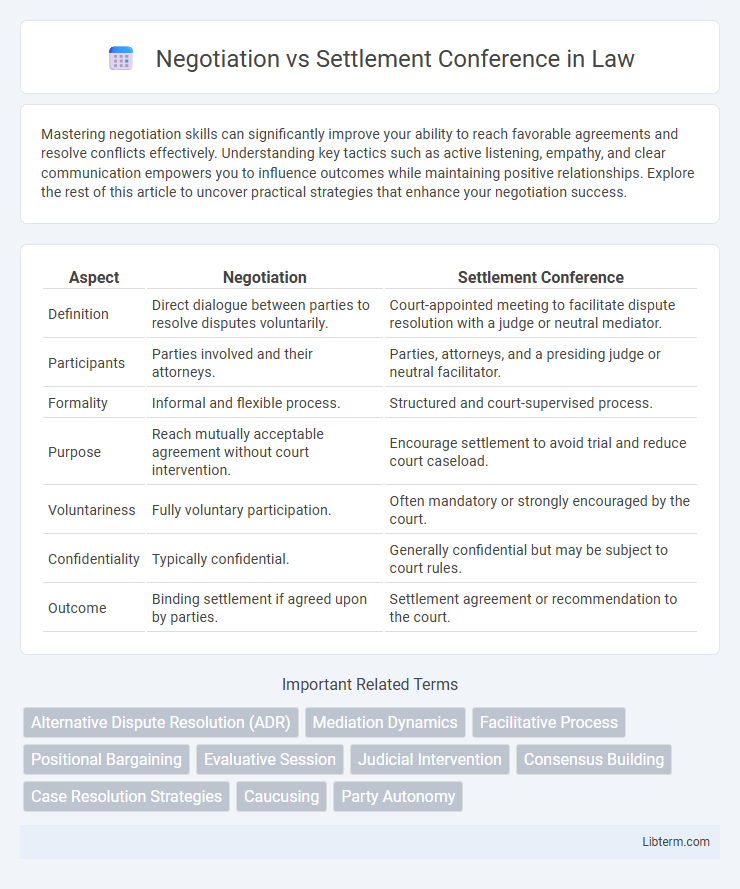Mastering negotiation skills can significantly improve your ability to reach favorable agreements and resolve conflicts effectively. Understanding key tactics such as active listening, empathy, and clear communication empowers you to influence outcomes while maintaining positive relationships. Explore the rest of this article to uncover practical strategies that enhance your negotiation success.
Table of Comparison
| Aspect | Negotiation | Settlement Conference |
|---|---|---|
| Definition | Direct dialogue between parties to resolve disputes voluntarily. | Court-appointed meeting to facilitate dispute resolution with a judge or neutral mediator. |
| Participants | Parties involved and their attorneys. | Parties, attorneys, and a presiding judge or neutral facilitator. |
| Formality | Informal and flexible process. | Structured and court-supervised process. |
| Purpose | Reach mutually acceptable agreement without court intervention. | Encourage settlement to avoid trial and reduce court caseload. |
| Voluntariness | Fully voluntary participation. | Often mandatory or strongly encouraged by the court. |
| Confidentiality | Typically confidential. | Generally confidential but may be subject to court rules. |
| Outcome | Binding settlement if agreed upon by parties. | Settlement agreement or recommendation to the court. |
Understanding Negotiation: A Definition
Negotiation is a strategic process where parties communicate directly to resolve disputes or reach agreements by discussing terms and finding mutually acceptable solutions. It emphasizes collaboration and compromise without involving a third party's judgment. Understanding negotiation involves recognizing its role as a flexible, voluntary dialogue aimed at achieving efficient and satisfactory outcomes for all involved.
What is a Settlement Conference?
A settlement conference is a court-ordered meeting where parties in a legal dispute discuss potential resolutions with the assistance of a neutral judge or mediator. This process aims to facilitate negotiation by clarifying issues, exploring settlement options, and encouraging agreement to avoid trial. Settlement conferences often save time and reduce litigation costs by promoting mutually acceptable outcomes before formal court proceedings.
Key Differences Between Negotiation and Settlement Conference
Negotiation is an informal, flexible process where parties directly communicate to reach a mutual agreement without third-party involvement, emphasizing autonomy and control over outcomes. In contrast, a settlement conference is a formal procedure facilitated by a neutral judge or mediator who guides discussions to help parties resolve disputes, often setting deadlines and encouraging compromise. The key difference lies in negotiation's voluntary nature versus the structured environment of a settlement conference designed to expedite resolution within legal frameworks.
Objectives of Negotiation in Legal Disputes
Negotiation in legal disputes aims to reach a mutually acceptable agreement by directly addressing the interests and concerns of all parties involved, minimizing costs and preserving relationships. The primary objective is to resolve conflicts without proceeding to trial, enabling more flexible and creative solutions tailored to the specific needs of the disputants. Effective negotiation reduces uncertainty and expedites resolution while maintaining control over the outcome for both plaintiff and defendant.
Goals and Structure of a Settlement Conference
A settlement conference aims to facilitate a resolution between disputing parties through a structured, informal meeting often overseen by a neutral third party such as a judge or mediator. Its goals include clarifying issues, exploring potential compromises, and encouraging settlement without proceeding to trial. The structure typically involves private discussions, confidential exchanges, and guided negotiations designed to narrow disputes and achieve mutually acceptable agreements.
Roles of Legal Professionals in Both Processes
Legal professionals in negotiation serve as advocates aiming to reach a mutually acceptable agreement through direct dialogue, often leveraging their expertise in contract law and conflict resolution. In settlement conferences, attorneys act as facilitators and advisors, guiding parties toward resolution under the oversight of a neutral third-party judge or mediator, emphasizing procedural knowledge and strategic assessment. Both roles require strong communication skills, but settlement conferences demand proficiency in courtroom protocols and an ability to evaluate case strengths impartially.
Advantages of Negotiation Over Settlement Conference
Negotiation offers greater flexibility by allowing parties to address underlying interests and tailor solutions without formal procedural constraints, enhancing the chances of a mutually beneficial agreement. It promotes direct communication and trust-building, which can lead to faster resolutions and reduced legal costs compared to the often structured and mediator-driven settlement conferences. Negotiation also preserves privacy and confidentiality more effectively by avoiding the involvement of third-party facilitators required in settlement conferences.
When to Choose a Settlement Conference Instead of Negotiation
A settlement conference is ideal when parties need a structured, court-supervised environment to facilitate resolution, often after initial negotiations have stalled or when complex legal issues require judicial input. Choosing a settlement conference can accelerate decision-making by involving a neutral judge or mediator who actively guides discussions and evaluates case strengths. This setting is preferred over informal negotiation for disputes needing formal procedure, clearer accountability, and the potential for a court-sanctioned agreement.
Common Outcomes: Negotiation vs Settlement Conference
Negotiation often results in flexible agreements tailored to the parties' specific interests, fostering collaborative solutions without formal intervention. Settlement conferences commonly produce court-endorsed resolutions, encouraging compromise under judicial guidance to avoid trial. Both methods aim to resolve disputes efficiently, but negotiation allows more informal, creative outcomes, while settlement conferences emphasize structured agreements.
Effective Strategies for Success in Both Approaches
Negotiation and settlement conferences both require clear communication, thorough preparation, and understanding the interests of all parties to achieve successful outcomes. Effective strategies include identifying key issues, developing realistic goals, and maintaining flexibility to explore creative solutions while managing emotions to foster cooperation. Utilizing objective criteria and building rapport can enhance trust and facilitate mutually acceptable agreements in both negotiation and settlement conference settings.
Negotiation Infographic

 libterm.com
libterm.com